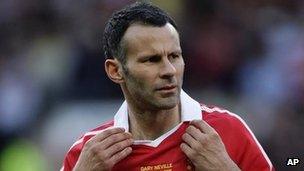Ryan Giggs can be legally named as 'affair' footballer
- Published

Ryan Giggs took out an injunction against the Sun newspaper and TV presenter Imogen Thomas
Ryan Giggs has consented to being named as the footballer behind a legal order preventing the publication of details of an alleged extra-marital affair.
Mr Giggs was granted the injunction in April 2011 after a 14 April article in the Sun on an unnamed player's alleged affair with model Imogen Thomas.
Despite the order, Mr Giggs was widely identified. The High Court heard that he had now consented to being named.
It is considering whether he can sue the Sun for alleged breach of privacy.
Breached by thousands
Mr Giggs had been granted an injunction on the basis that TV presenter Ms Thomas appeared to have been trying to blackmail him.
However, the 2003 Miss Wales and former Big Brother contestant took legal action against him and, in December 2011, Mr Giggs accepted that she had not been blackmailing him.

Mr Giggs has accepted that Ms Thomas did not try to blackmail him
In court on Tuesday, Mr Giggs's lawyer - Hugh Tomlinson QC - said the injunction that had been supposed to stop his client being identified as the subject of the Sun's story had been breached by thousands of people on the internet.
Mr Tomlinson said there had been "large scale and continued breaches of the order by a number of malign individuals" who had put his client's name in the public domain.
Mr Giggs, a former Welsh international who has played for Manchester United for 20 years, was widely identified on social networking sites and in a Scottish newspaper.
In May, Lib Dem MP John Hemming also named Mr Giggs during an urgent Commons question on privacy orders.
Using parliamentary privilege to break the court order, he said it would not be practical to imprison the 75,000 Twitter users who had named the player.
'Damage and distress'
Mr Tomlinson said his client was claiming damages from the Sun for the subsequent re-publication of information in other newspapers and on the internet.
"He has suffered damage and distress by the chain of events that has been set off by the publication of the article in the Sun," he said.
"We say the printing of information on the front page of a national newspaper can give rise to an action for misuse of private information."
Mr Tomlinson said the Sun article had "generated a large media storm" and that the damages claim was about "providing effective protection" for Mr Giggs's right to privacy under the European Convention on Human Rights.
For News Group Newspapers - which publishes the Sun - Richard Spearman QC said the newspaper had behaved "entirely properly".
He said the original account of the affair published in the Sun was an "extremely generalized and anodyne" account.
"We didn't identify him. We didn't intend to identify him," he said. "On the damages for publication, it is dead in the water, this case."
Mr Spearman said the Sun had informed Mr Giggs about the article before it was published, giving him an opportunity to seek an injunction.
He said legal action had been "spun along for a long, long time", but Mr Tomlinson said that allegation was "wholly without foundation".
After hearing legal arguments at the Royal Courts of Justice in London, Mr Justice Tugendhat reserved his decision on whether the case should go to trial.
- Published15 December 2011
- Published23 May 2011
- Published24 May 2011